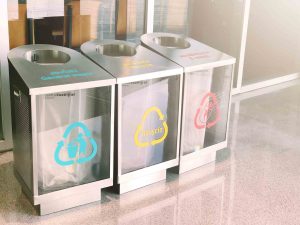Companies are shifting towards making sustainability a core part of their business in response to shareholder, employee, and customer demands. Part of the shift includes optimizing how waste is managed and diverting more of it from landfill.
So, in a large-scale environment, how can commercial waste management be implemented sustainably and responsibly?
What is commercial waste management?
Commercial waste management, as opposed to municipal waste management, deals with waste generated by a range of industries, such as hotels and restaurants to hospitals and construction firms. Each industry has its own specific types of waste and removal requirements and businesses are responsible for arranging commercial waste haulers that can handle their particular waste streams.
Commercial waste management and technology
Today, developments in big data, blockchain, radio-frequency identification (RFID) tracking, smartphone connectivity, and advanced automation are quickly changing the landscape, reinventing the way waste is managed on a fundamental level.
As technology begins to be adapted by the industry, it has the potential to offer businesses greater value and significantly more control over their waste management needs. Insightful waste diversion metrics and other datasets, virtual education programs for staff, on-demand collections, and the ability to deal with varied waste streams can provide more sustainable waste management systems to businesses.
The commercial waste management sector has a large part to play in the tools they provide to support businesses in adopting responsible waste management practices.
Why is commercial waste management so important?
While there is no one-size-fits-all answer to that question, partnering with the right commercial waste management company can help businesses bring greater awareness and efficiencies to all stages of the waste management cycle (education, handling, transfer, and processing).
 For business executives, this means that there are many opportunities to make a real impact. Businesses generate significantly more waste than individual households, and partnering with a responsible commercial waste management vendor should ensure each type of waste can be disposed of in the correct facilities.
For business executives, this means that there are many opportunities to make a real impact. Businesses generate significantly more waste than individual households, and partnering with a responsible commercial waste management vendor should ensure each type of waste can be disposed of in the correct facilities.
While each city will offer guidance on where different waste streams can be delivered, it is usually commercial waste management companies who connect the dots for businesses—providing education, advice, materials (such as recycling bins or signage) and, of course, collection.
In the US, the commercial sector is a key driver of sustainable and responsible practices. Responsible waste management’s importance to all types of businesses is clear when considering both brand image and compliance. Retaining the services of a waste management company that shares your values should not be underestimated.
For more information on what commercial waste management and recycling means in the 21st century, subscribe to the RTS blog. Additionally, for businesses looking to advance their sustainability goals and improve recycling, contact our LEED Accredited team to discuss your requirements.

